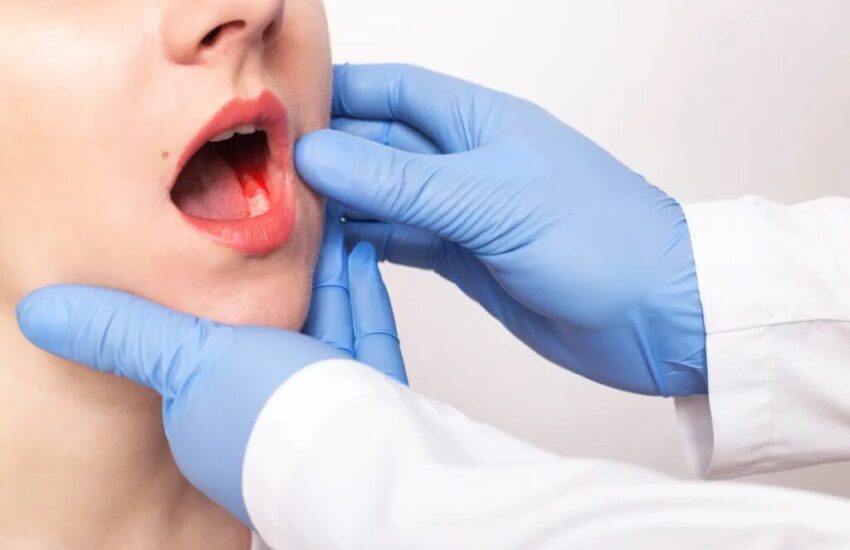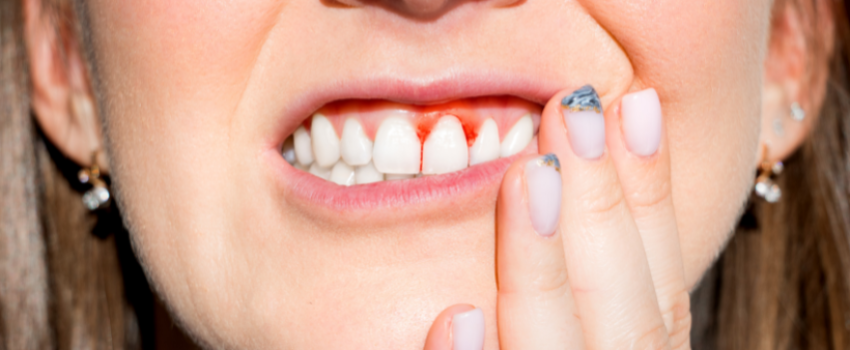Bleeding Gums During Pregnancy: Is That Normal?

Published May 15, 2023
Oral health is an important aspect of overall health, and it becomes even more crucial during pregnancy. Hormonal changes during pregnancy can lead to a variety of dental problems, including bleeding gums. Bleeding gums during pregnancy is defined as any bleeding that occurs when brushing or flossing your teeth.
Bleeding Gums During Pregnancy
Bleeding gums during pregnancy is a common concern for many women, with some studies reporting that 60% to 75% of pregnant women experience bleeding gums at some point during their pregnancy. While bleeding gums may be common during pregnancy, it is important to discuss this issue with your healthcare provider to ensure that there are no underlying health problems.
Risk Associated with Bleeding Gums During Pregnancy
During pregnancy, bleeding gums can be a common occurrence, but it is still important to visit a dentist to prevent potential complications such as periodontal disease; this is an infection of the gums and surrounding bone.
While most studies have shown that periodontal disease may increase the risk of low birth weight, premature birth, and preeclampsia, other studies have not shown an association. Nonetheless, it is still important to take good care of your teeth during pregnancy to ensure oral health.
Why Do Gums Bleed During Pregnancy
There are several reasons why bleeding gums may occur during pregnancy. The possible causes include:
- Hormonal changes during pregnancy can cause an increase in blood flow to the gums, which can make them more sensitive and prone to bleeding. Additionally, poor oral hygiene can contribute to bleeding gums during pregnancy.
- During pregnancy, hormonal changes can cause a decrease in saliva production in some women. This decrease in saliva can lead to longer exposure of carbohydrates to the teeth, which can result in the buildup of plaque. Plaque is a soft and sticky substance that contains bacteria that can cause gum disease and tooth decay.
- In addition to decreased saliva production, the saliva of pregnant women is more acidic compared to non-pregnant women. This increased acidity can reduce the effectiveness of saliva as a buffer, which can raise the risk of tooth erosion and decay caused by acid.
- For pregnant women experiencing morning sickness, it is important to rinse the mouth with water after vomiting to wash away stomach acid. However, it is recommended to wait for at least an hour before brushing as the acid may have softened the enamel on the teeth.
Prevention and Treatment
Here are nine effective ways to prevent bleeding gums during pregnancy:
1. Maintain Good Oral Hygiene
Good oral hygiene is essential for preventing bleeding gums during pregnancy. Brush your teeth twice daily for the recommended two minutes each time and floss it as well at least once a day. Make sure to use a fluoride toothpaste together with a soft-bristled toothbrush.
2. Use a Soft-Bristled Toothbrush
A soft-bristled toothbrush can help prevent gum irritation and bleeding during pregnancy. Avoid using medium or hard-bristled toothbrushes, which can damage your gums and teeth.
3. Floss Daily
Flossing helps remove food particles and plaque from between your teeth and gums, preventing gum disease and bleeding gums. If flossing is uncomfortable, try using an interdental cleaner, such as a dental pick or water flosser.
4. Rinse with Saltwater
Rinsing your mouth with saltwater can help reduce gum inflammation and promote healing. Mix a teaspoon of salt with warm water and swish the solution around your mouth for 30 seconds before spitting it out.
5. Use Herbal Remedies
Some herbal remedies, such as chamomile tea or aloe vera gel, can help reduce gum inflammation and promote healing. Consult with your healthcare provider before using any herbal remedies.
6. Increase Vitamin C Intake
Vitamin C is also used for maintaining healthy gums and teeth. Eat foods high in vitamin C, such as oranges, strawberries, and broccoli, or take a vitamin C supplement as directed by your healthcare provider.
7. Eat a Balanced Diet
A balanced diet that includes a variety of fruits, vegetables, and whole grains can help improve your oral health and prevent bleeding gums during pregnancy. Avoid sugary and processed foods, which can increase the risk of gum disease and tooth decay.
8. Avoid Sugary and Acidic Foods and Beverages
Sugary and acidic foods and beverages can erode your tooth enamel and increase the risk of gum disease. Limit your intake of sugary and acidic foods and beverages, such as soda, candy, and citrus fruits.
9. Visit Your Dentist Regularly
Regular dental checkups and cleanings can help prevent bleeding gums during pregnancy. Your dentist can identify and treat early signs of gum disease and provide tips for maintaining good oral health.

When to See a Doctor?
While bleeding gums during pregnancy is a common issue, there are certain situations where you should seek medical attention. If bleeding gums persist despite good oral hygiene, or if they are accompanied by other symptoms such as pain, swelling, or bad breath, you should consult with your dentist. Additionally, if you are experiencing discomfort or pain due to bleeding gums, it is important to seek medical attention as soon as possible.
Benefit From The Latest Advancements In Probiotic Science With Bionaze
Bionaze is a proprietary blend of probiotics proven to promote ear, nose, and throat health, improve digestion, and support your immune system. The active ingredients BLIS K12, and BL-04 are considered among the best probiotics according to science.
Get 25% Off Your First Order when you use BIO25 at checkout!

This Content Has Been Reviewed For Factual Accuracy
This content has undergone thorough fact-checking by our team of internal experts. Learn more about the meticulous editorial standard for our website here.
ADVERTISEMENT

About The Author
Krizzia Paolyn has a bachelor’s degree in Psychology. She started her career as a content writer for various digital magazines and renowned publications. It has always been her passion to share her voice, and at the same time, to encourage other people to speak up.




